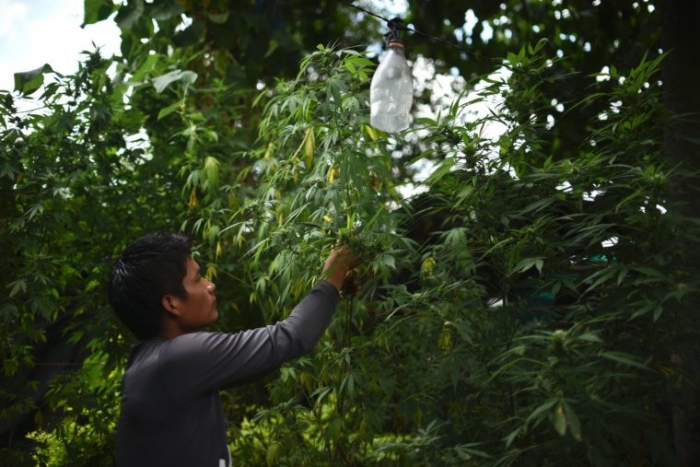You are here
Home 🌿 Marijuana Business News 🌿 Colombia's medical marijuana industry could become bigger than coffee and flower business 🌿Colombia's medical marijuana industry could become bigger than coffee and flower business

In the Andean hills of Antioquia, Colombia, greenhouses covered with white tarpaulin sheets dot the countryside. For now they are all used for growing flowers — but the soil here is being prepared for a more contentious crop.
“The medical marijuana industry can become bigger than coffee, bigger than flowers,” said a smiling Patricio Stocker, chief executive of PharmaCielo, the first company licensed to roll out production of medical marijuana in Colombia. “Our aim is to help the most [troubled] regions in the country.”
Last year, Colombian President Juan Manuel Santos reformed antiquated drug laws and legalised domestic use of medical marijuana. The overhaul included permission for the commercial cultivation, processing and exportation of cannabis — as long as it is used for medicinal purposes.
Cannabis growing expertise
Companies like PharmaCielo, which is now waiting for final approval, want to take advantage of Colombia’s historical — if illegal — expertise in growing cannabis. They also hope that experience garnered from the flower growing industry will set them in good stead to grow marijuana on an industrial scale.
“The flower industry in Colombia exports around 20 percent of the flowers in the world,” Mr Stocker said. “This model really takes advantage of the flower growing industry.”
As Colombia begins to move on from a bloody half century of war, this new industry will help provide former Farc rebels — themselves no stranger to the illegal drugs trade — with employment as the medical marijuana industry blooms.
For Mr Stocker, of Argentine and German parentage, medical marijuana production will help secure a hard fought peace.
Out of war and into peace Former Farc rebels could be provided with employment as the medical marijuana industry blooms (AFP/Getty Images)
“Politicians and local communities want to develop the region and cannabis, combined with other agricultural activity will take them out of poverty.”
Patricio Stocker, chief executive of PharmaCielo
“Colombia is getting out of a war and getting into a peace process,” Mr Stocker said. “Laws require that 20 per cent of what we produce should come from small growers, many of who come from the illegal [rebel] groups .”
In Cauca, the Caucannabis cooperative, formed in mid-2016 by a group of 53 local farmers, has applied with PharmaCielo for a joint licence for cultivating medicinal cannabis in the department, a move supported by government ministers.
For years, Cauca was ravaged by warring guerrillas, paramilitaries and drug-traffickers. Now there is hope this budding industry will boost employment and develop local infrastructure – and provide an economic alternative to the black hole of illicit narcotics.
“They were in very bad shape in this area, they have a very long history of suffering there,” Mr Stocker added. “It is not just developing the cannabis business. This will help generate funds to develop other businesses. Politicians and local communities want to develop the region and cannabis, combined with other agricultural activity will take them out of poverty.”
Regions like Cauca are desperately poor. It is these conditions that make growing coca, the chief ingredient in cocaine, such an attractive prospect. It is hoped that with medical marijuana predicted to become a multi-billion dollar industry, coca producers can move away from illicit crops.
Marijuana could transform communities
Professor Hernando Zuletta, director of the Centre for Drugs and Security at Bogota’s University of the Andes told i: “Marijuana could be very important to those communities. The transformation [in Cauca] could be huge.”
“We expect that Colombia is going to be the lead country in Latin America in the production of medical marijuana,” said health minister Alejandro Gaviria. “We want to build agri-exports around medical marijuana, that’s what we want to focus on.”
President Santos has been increasingly opposed to the prohibition-based global “war on drugs”. Minister Gaviria said peace with the Farc provided an opportunity to build a better policy.
“President Santos has been saying this over and over again,” Mr Gaviria continued. “The peace agreement with the Farc is a good opportunity to have a successful drug policy,” and hopefully transform Colombia from the continent’s epicentre of drug crime and violence into a country leading the way out of the darkness.
420 Intel is Your Source for Marijuana News
420 Intel Canada is your leading news source for the Canadian cannabis industry. Get the latest updates on Canadian cannabis stocks and developments on how Canada continues to be a major player in the worldwide recreational and medical cannabis industry.
420 Intel Canada is the Canadian Industry news outlet that will keep you updated on how these Canadian developments in recreational and medical marijuana will impact the country and the world. Our commitment is to bring you the most important cannabis news stories from across Canada every day of the week.
Marijuana industry news is a constant endeavor with new developments each day. For marijuana news across the True North, 420 Intel Canada promises to bring you quality, Canadian, cannabis industry news.
You can get 420 Intel news delivered directly to your inbox by signing up for our daily marijuana news, ensuring you’re always kept up to date on the ever-changing cannabis industry. To stay even better informed about marijuana legalization news follow us on Twitter, Facebook and LinkedIn.




